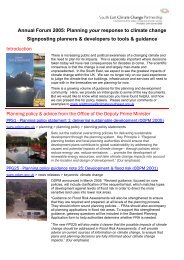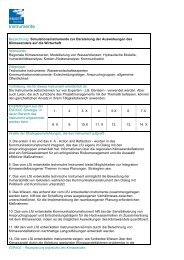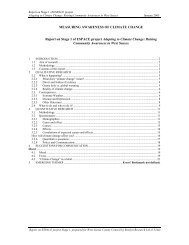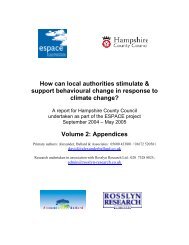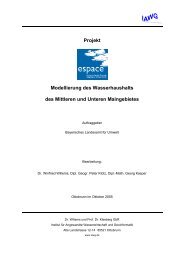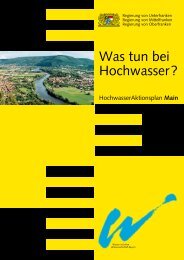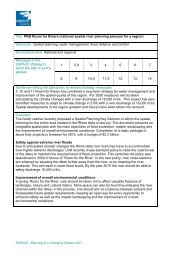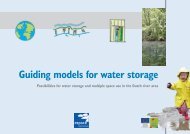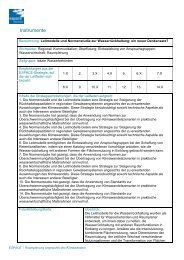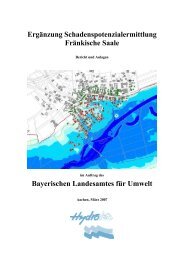Climate Change and the European Water Dimension - Agri ...
Climate Change and the European Water Dimension - Agri ...
Climate Change and the European Water Dimension - Agri ...
Create successful ePaper yourself
Turn your PDF publications into a flip-book with our unique Google optimized e-Paper software.
At <strong>the</strong> 2003 Rome Informal Meeting of <strong>the</strong> <strong>Water</strong> Directors, <strong>the</strong>y requested that <strong>the</strong><br />
JRC coordinate <strong>the</strong> preparation of a scientific document on climate change<br />
emphasizing Europe <strong>and</strong> <strong>the</strong> dimension of <strong>the</strong> water resource implications of a<br />
climate changed world. The JRC accepted <strong>the</strong> challenge <strong>and</strong> sought <strong>the</strong><br />
collaboration of more than 40 scientists from Europe <strong>and</strong> within <strong>the</strong> JRC to draft a<br />
scientific syn<strong>the</strong>sis of what we know or think we know about climate change <strong>and</strong> its<br />
impacts on water resources at <strong>the</strong> <strong>European</strong> scale. This report, which increases <strong>the</strong><br />
knowledge base on climate change, would <strong>the</strong>n be used,, along with o<strong>the</strong>r recently<br />
issued reports by <strong>the</strong> EEA (2004) <strong>and</strong> <strong>the</strong> Arctic Council (2004) to address <strong>the</strong><br />
question whe<strong>the</strong>r existing EU water policy <strong>and</strong> anticipated evolution of water policy<br />
could accommodate <strong>the</strong> protection of <strong>European</strong> water resources in a climatechanged<br />
world. The draft outline of <strong>the</strong> report now titled <strong>Climate</strong> <strong>Change</strong> <strong>and</strong> <strong>the</strong><br />
<strong>European</strong> <strong>Water</strong> <strong>Dimension</strong> was approved at <strong>the</strong> <strong>Water</strong> Directors Meeting in Rome.<br />
The Report is a scientific synthsis, not a concensus document, of many but not all<br />
dimensions of <strong>the</strong> climate change phenomena in <strong>the</strong> water sector.<br />
The Report is organized into six chapters progressing from <strong>the</strong> global to <strong>European</strong><br />
perspectives of climate change, initially based on <strong>the</strong> IPCC 2001 report but updated<br />
with new published information, potential aquatic impacts in different aquatic sectors<br />
<strong>and</strong> case studies. Specifically, Chapters I <strong>and</strong> II present <strong>the</strong> global <strong>and</strong> <strong>European</strong><br />
perspective on climate change predictions, scenarios <strong>and</strong> impacts. Chapter III<br />
summarizes <strong>the</strong> hydrological cycle <strong>and</strong> <strong>the</strong> compartments <strong>and</strong> flows most sensitive to<br />
climate change impacts. Chapter IV provides a summary of <strong>the</strong> global <strong>and</strong> regional<br />
indicators of climate variability such as <strong>the</strong> North Atlantic Oscillation, <strong>and</strong> <strong>the</strong>n<br />
proceeds to provide analyses of real <strong>and</strong> potential climate change impacts on lakes,<br />
coastal <strong>and</strong> marine systems, <strong>and</strong> Mediterranean lagoons (as an example of an<br />
especially sensitive aquatic ecosystem). Chapter V is a series of sub-chapters<br />
addressing some of <strong>the</strong> major challenges in climate change scenarios such as<br />
floods, droughts, changing ecological status <strong>and</strong> <strong>the</strong> WFD, <strong>and</strong> water in agriculture.<br />
Chapter VI provides a series of case studies highlighting <strong>the</strong> reality of climate change<br />
<strong>and</strong> variability as witnessed for four lakes in Europe, <strong>the</strong> Venice lagoon, <strong>and</strong> <strong>the</strong> Ebro<br />
<strong>and</strong> Po River Basins. Fur<strong>the</strong>r chapters address <strong>the</strong> issues of water-borne <strong>and</strong><br />
vector-borne disease likely exacerbated by climate change. The last part of Chapter<br />
VI introduce <strong>the</strong> potential implications of climate change as a perturber of <strong>the</strong> global<br />
Hg cycle <strong>and</strong> to mobilization of persistent organic chemicals such as dioxins <strong>and</strong><br />
PCBs as a result of floods <strong>and</strong> general temperature increases.<br />
The Key Points of this Report are presented at <strong>the</strong> beginning of each Chapter to<br />
provide additional clarity in grasping <strong>the</strong> information <strong>and</strong> knowledge. The chapters<br />
document rising temperatures, sea level rise, intensification of <strong>the</strong> hydrologic cycle,<br />
<strong>the</strong> competing needs of different water sectors exacerbated by climate-induced<br />
change, <strong>the</strong> warming of large lakes <strong>and</strong> <strong>the</strong> global ocean including <strong>the</strong> Mediterranean<br />
Sea, ecosystems at risk <strong>and</strong> <strong>the</strong> potential for indirect effects hardly imagined today.<br />
It is beyond <strong>the</strong> scope of this report to make specific recommendations to <strong>the</strong> policy<br />
makers how <strong>the</strong>y might address <strong>the</strong> climate-induced changes in <strong>the</strong> water sector.<br />
However surrounding <strong>the</strong> release of <strong>the</strong> report <strong>and</strong> discussions at <strong>the</strong> Amsterdam<br />
<strong>Water</strong> Directors Meeting in December 2004 <strong>and</strong> over numerous coffees, some<br />
suggestions for discussion were raised.<br />
In <strong>the</strong> area of adaptation, <strong>the</strong>re is a need to:<br />
• Identify <strong>and</strong> detect signals of climate change in inl<strong>and</strong> <strong>and</strong> coastal waters.<br />
• Develop indicators sensitive to climate variability <strong>and</strong> climate change of <strong>the</strong><br />
impacts on inl<strong>and</strong> <strong>and</strong> coastal waters.<br />
7



